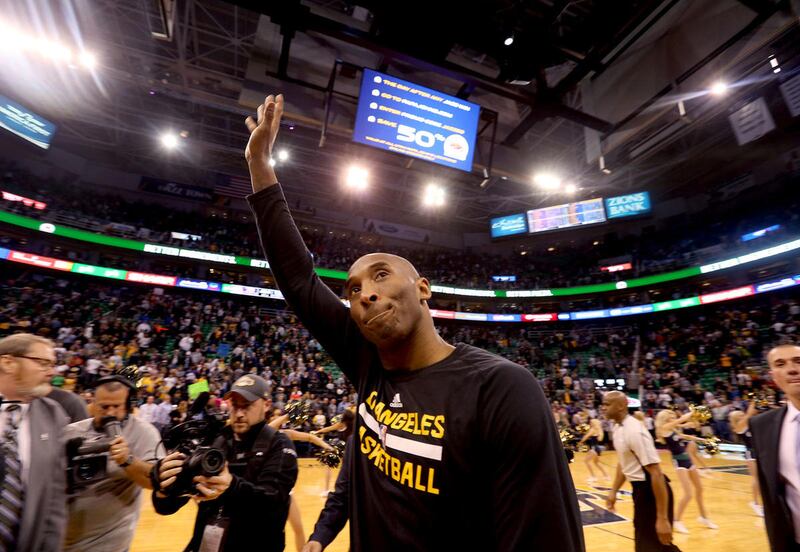With Kobe Bryant set to play the final game of his 20-year career Wednesday in Los Angeles against the Utah Jazz, he is being hailed as one of the great players in the history of the game.
But is it merited?
To assess Bryant’s career, I reached out to Dr. David Berri, a sports economist and professor of applied economics at Southern Utah University and the author of “Wages of Wins” and “Stumbling on Wins.”
His work has earned considerable respect (even NBA general managers call him to talk shop). Berri's books are in the vein of “Moneyball,” the movie and book that demonstrated that baseball managers, scouts and fans value the wrong statistics. That is the case throughout the sports world.
Football tends to value total passing yards instead of yards per attempt and the touchdowns-to-interceptions ratio just as baseball values home runs and batting average instead of on-base percentage. And then there’s basketball, which values total points scored instead of shooting efficiency. An examination of the more meaningful sports statistics reveals something much different than what people perceive.
So how does Bryant stack up? “Very overrated,” says Berri. “There’s this huge idea that this guy is really great, but it doesn’t fit the data.”
We’ll get to the data shortly, but right now I can hear Bryant fans screaming, “But he won five championships!!!” According to this logic, Robert Horry, with seven championships, was better than Bryant, Michael Jordan (6 titles), Karl Malone (0) and Charles Barkley (0), and that Luc Longley (3) was one of the greats.
“The purpose of statistical analysis is to separate the player from his teammates,” says Berri. “Kobe didn't win five titles by himself. He won titles when he had teammates named Shaquille O'Neal and Pau Gasol. When he didn't have teammates with those names, he didn't win any titles. The stats tell us that O'Neal and Gasol were more important to these teams than Kobe.”
The problem is that the entire basketball model rewards players who score lots of points via salaries, playing time, endorsements, lottery picks. The more important stat is shooting percentage — shooting efficiency. Any player could score 20 points if he took enough shots. Meanwhile, the other team is rebounding the misses and getting other opportunities to score.
Let’s look at Bryant’s career.
Perception 1 — He was a good shooter. Actually, he scored a lot of points, but that doesn’t mean he was a good shooter. He averaged 25.4 points per game — but he also took a lot of shots — an average of 19.4 per game. There’s a metric called Effective Field Goal Percentage, which adjusts for the fact that 3-point field goals are worth 50 percent more than two-point field goals. A straight field goal percentage isn’t fair to players who shoot a lot of 3-point shots. Hall of Fame center Bob Lanier did most of his scoring from within a few feet of the basket and made 51 percent of his shots; Hall of Fame guard Reggie Miller’s career shooting percentage was 47.1 while taking many of his shots from 3-point range. Miller’s effective field goal percentage is 54.4 and Lanier’s remains 51.4. Back to Bryant: His effective field goal percentage is average — 48 percent, same as Carmelo Anthony. Michael Jordan’s was 51. To put it in simpler terms, Bryant is the third highest scorer in NBA history — but also missed more shots than anyone in history.
Perception 2 — He was a clutch shooter. “That’s a myth,” says Berri. “He hit last-second shots because he insisted on taking them, but he was not good at it.” Ignoring the demise of the Lakers and the onset of injuries and age in recent years, let’s look at the first 15 years of Bryant’s career. During those years he took 115 shots in the final 24 seconds and made only 36 of them, or 31 percent.
Perception 3 — He wins games. Actually, his teams won games, but statistically speaking, he wasn’t the reason. Berri collaborated with Martin Schmidt and Stacey Brook to create a metric called WP48 — wins produced per 48 minutes. “Basketball is a simple game,” says Berri. “Wins are determined by gaining possession of the ball (rebounds and turnovers) and turning those possessions into the points (shooting efficiency).” And those are the numbers used to calculate WP48.
An average team wins 0.5 (50 percent) of its games; there are five players, so each player on that team would receive a WP48 value of 0.1. Bryant’s WP48 at its peak was .189 — just a little above average. His career WP48 is .124, the result of playing so long and well into his physical decline. Jordan’s peak was .386. His career WP48 is .233 because, like Bryant, he played well after his peak. LeBron James’ peak was .345 in 2008 and has been declining since then (his career WP48 is .264).
The bottom line: “I would say Kobe is a good player, not great,” says Berri.
Doug Robinson's columns run on Tuesdays and Wednesdays. Email: drob@deseretnews.com





